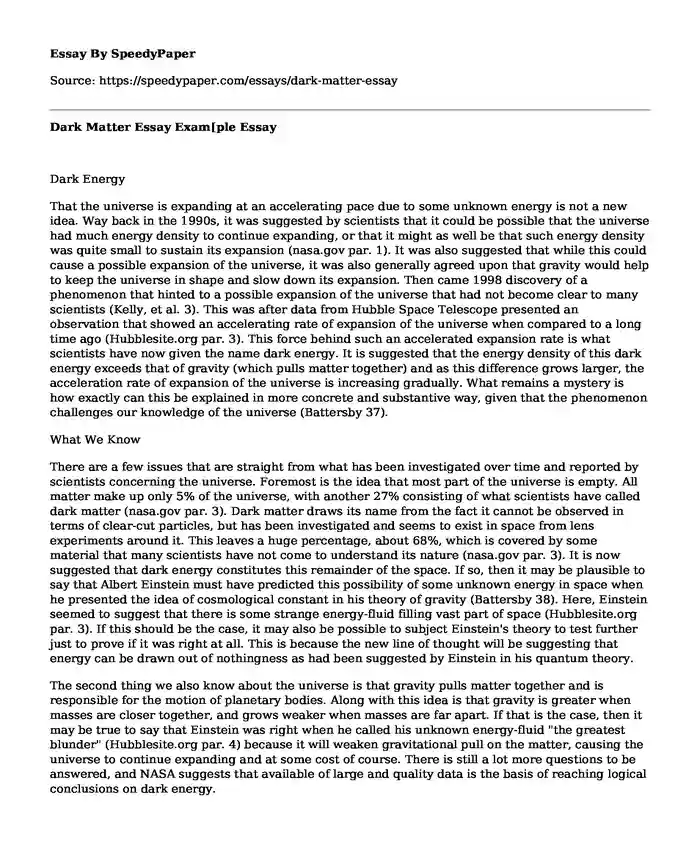Dark Energy
That the universe is expanding at an accelerating pace due to some unknown energy is not a new idea. Way back in the 1990s, it was suggested by scientists that it could be possible that the universe had much energy density to continue expanding, or that it might as well be that such energy density was quite small to sustain its expansion (nasa.gov par. 1). It was also suggested that while this could cause a possible expansion of the universe, it was also generally agreed upon that gravity would help to keep the universe in shape and slow down its expansion. Then came 1998 discovery of a phenomenon that hinted to a possible expansion of the universe that had not become clear to many scientists (Kelly, et al. 3). This was after data from Hubble Space Telescope presented an observation that showed an accelerating rate of expansion of the universe when compared to a long time ago (Hubblesite.org par. 3). This force behind such an accelerated expansion rate is what scientists have now given the name dark energy. It is suggested that the energy density of this dark energy exceeds that of gravity (which pulls matter together) and as this difference grows larger, the acceleration rate of expansion of the universe is increasing gradually. What remains a mystery is how exactly can this be explained in more concrete and substantive way, given that the phenomenon challenges our knowledge of the universe (Battersby 37).
What We Know
There are a few issues that are straight from what has been investigated over time and reported by scientists concerning the universe. Foremost is the idea that most part of the universe is empty. All matter make up only 5% of the universe, with another 27% consisting of what scientists have called dark matter (nasa.gov par. 3). Dark matter draws its name from the fact it cannot be observed in terms of clear-cut particles, but has been investigated and seems to exist in space from lens experiments around it. This leaves a huge percentage, about 68%, which is covered by some material that many scientists have not come to understand its nature (nasa.gov par. 3). It is now suggested that dark energy constitutes this remainder of the space. If so, then it may be plausible to say that Albert Einstein must have predicted this possibility of some unknown energy in space when he presented the idea of cosmological constant in his theory of gravity (Battersby 38). Here, Einstein seemed to suggest that there is some strange energy-fluid filling vast part of space (Hubblesite.org par. 3). If this should be the case, it may also be possible to subject Einstein's theory to test further just to prove if it was right at all. This is because the new line of thought will be suggesting that energy can be drawn out of nothingness as had been suggested by Einstein in his quantum theory.
The second thing we also know about the universe is that gravity pulls matter together and is responsible for the motion of planetary bodies. Along with this idea is that gravity is greater when masses are closer together, and grows weaker when masses are far apart. If that is the case, then it may be true to say that Einstein was right when he called his unknown energy-fluid "the greatest blunder" (Hubblesite.org par. 4) because it will weaken gravitational pull on the matter, causing the universe to continue expanding and at some cost of course. There is still a lot more questions to be answered, and NASA suggests that available of large and quality data is the basis of reaching logical conclusions on dark energy.
Works Cited
Battersby, Stephen. "Dark Matter, Dark Energy, Dark… Magnetism?". New Scientist 214.2867 (2012): 36-39. Print.
Chung, Daniel, Andrew Long, and Lian-Tao Wang. "Probing The Cosmological Constant And Phase Transitions With Dark Matter". Physical Review D 84.4 (2011). Print.
"Dark Energy, Dark Matter | Science Mission Directorate". Science.nasa.gov. N.p., 2016. Web. 20 Oct. 2016.
Frieman, Joshua. "Dark Energy: Theory And Observations; Dark Energy". Physics Today 64.6 (2011): 53. Web.
"Hubblesite - Dark Energy - What Is Dark Energy?". Hubblesite.org. N.p., 2016. Web. 20 Oct. 2016.
Kelly, Patrick L. et al. "CONSTRAINTS ON THE PROGENITOR SYSTEM OF THE TYPE Ia SUPERNOVA 2014J FROM PRE-EXPLOSION HUBBLE SPACE TELESCOPE IMAGING". ApJ 790.1 (2014): 3. Web.
Cite this page
Dark Matter Essay Exam[ple. (2017, Nov 27). Retrieved from https://speedypaper.com/essays/dark-matter-essay
Request Removal
If you are the original author of this essay and no longer wish to have it published on the SpeedyPaper website, please click below to request its removal:
- Continuing to articulate a compelling reason for the change
- Free Essay Comparing the Articles of Confederation and the Constitution
- Essay Sample on a Discussion on Human Learning
- Actual Outcomes/Evaluation
- Essay Example on Strategic Planning: Navigating Healthcare Amidst Limited Resources
- Research Paper on The Influence Of Transportation Infrastructure on Economic Development in China
- Paper Example. Determining the Target Population
Popular categories





